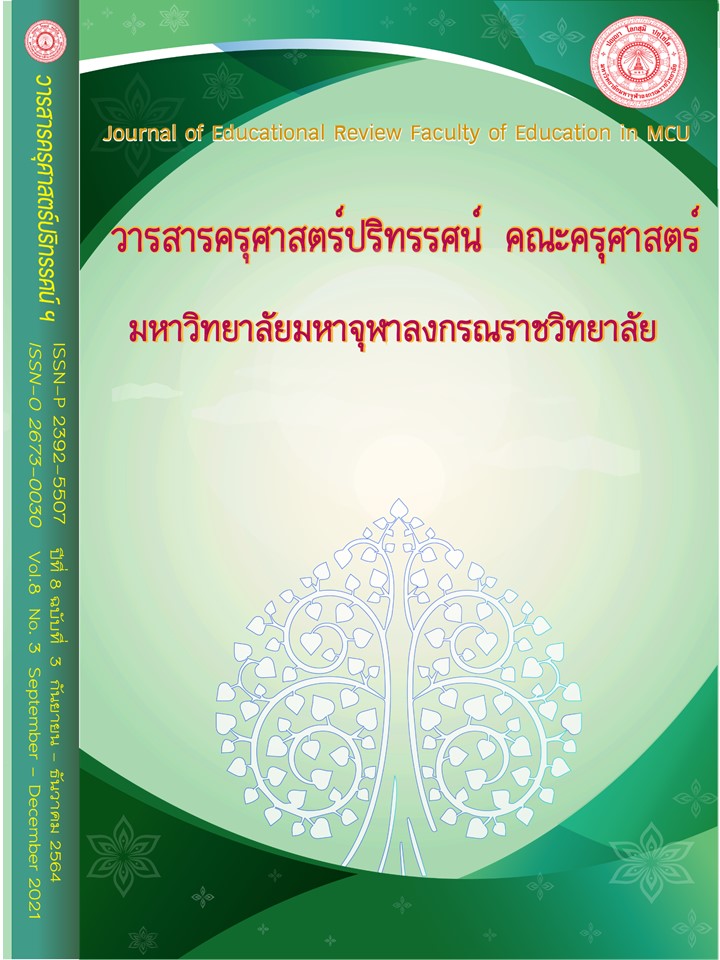INNOVATIVE DEVELOPMENT IN ADMINISTRATION OF CHARITY SCHOOLS IN BUDDHISM
Main Article Content
Abstract
This research article aimed to propose innovations in administration of charity schools in Buddhism. Mixed methods research consisting of quantitative research and qualitative research was conducted. There were 3 research steps as follows: Step 1 Study the administration condition of charity schools in Buddhism. A questionnaire was used for data collection from 357 administrators and teachers of Buddhist temple charity schools. The research tool was a questionnaire, and data were analyzed with statistics consisted of percentage, frequency, mean, and standard deviation. Step 2 Develop innovation by interviewing 10 key informants, and the research tool was the interview form. Focus group discussions with 10 experts was also conducted, and the tool was questions for the discussions. Data were analyzed by using content analysis. Step 3 to propose innovations, innovation of charity school administration of Buddhist Temples, it was an innovation that promotes higher efficiency and effectiveness of school management. It consisted of 4 types of innovations: 1) 10 Academic management innovations, 2)5 Human resource management innovations, 3) 3 Budget management innovations, and 4) 8 General management innovations.
Article Details
ทัศนะและความคิดเห็นที่ปรากฏในบทความในวารสารฉบับนี้ถือเป็นความรับผิดชอบของผู้เขียนบทความนั้นเพียงผู้เดียว และไม่ถือเป็นทัศนะและความรับผิดชอบของกองบรรณาธิการ
กองบรรณาธิการขอสงวนสิทธิ์ในการคัดเลือกบทความลงตีพิมพ์และจะแจ้งให้เจ้าของบทความทราบหลังจากผู้ประเมินบทความตรวจอ่านบทความแล้ว
ต้นฉบับที่ได้รับการตีพิมพ์ในวารสารครุศาสตร์ปริทรรศน์ คณะครุศาสตร์ มหาวิทยาลัยมหาจุฬาลงกรณราชวิทยาลัย ถือเป็นกรรมสิทธิ์ของคณะครุศาสตร์ มหาวิทยาลัยมหาจุฬาลงกรณราชวิทยาลัย ห้ามนำข้อความทั้งหมดหรือบางส่วนไปพิมพ์ซ้ำ เว้นเสียแต่ว่าจะได้รับอนุญาตจากมหาวิทยาลัยฯ เป็นลายลักษณ์อักษร
References
กรณ์สิณี ฐิติกรประภาพงศ์ และปิยะนาถ บุญมีพิพิธ. (2558). การจัดการเทคโนโลยีสารสนเทศที่ส่งผลต่อการใช้อินเทอร์เน็ตในการจัดกระบวนการเรียนรู้ของครูในสถานศึกษาสังกัดส านักงานเขตพื้นที่การศึกษาประถมศึกษาเพชรบุรี เขต 2. Veridian E-Journal, Slipakorn University ฉบับภาษาไทย สาขามนุษยศาสตร์สังคมศาสตร์ และศิลปะ. 8(3). 1-13.
กระทรวงศึกษาธิการ. (2546). พระราชบัญญัติการศึกษาแห่งชาติ พ.ศ. 2542 และที่แก้ไขเพิ่มเติม (ฉบับที่ 2) พ.ศ. 2545. กรุงเทพมหานคร: กระทรวงศึกษาธิการ.
นรินทร์ สังข์รักษา. (2552). การศึกษาความสัมพันธ์ระหว่างมโนภาพแห่งตนกับผลสัมฤทธิ์ทางการเรียนของนักศึกษา คณะศึกษาศาสตร์ มหาวิทยาลัยศิลปากร. รายงานวิจัย. คณะศึกษาศาสตร์ มหาวิทยาลัยศิลปากร.
ไพฑูรย์ พิมดี และคณะ. (2560). การพัฒนาการศึกษาภายใต้กรอบประเทศไทย 4.0 สู่ศตวรรษที่ 21. วารสารครุศาสตรอุตสาหกรรม. 16(2). 199-205.
รสสุคนธ์ มกรมณี. (2555). การจัดการเรียนรู้เพื่อสร้างสรรค์ด้วยปัญญา. วารสารการศึกษาไทย. 3(1). 38-40.
ราชบัณฑิตยสถาน. (2556). พจนานุกรรม ฉบับราชบัณฑิตยสถาน. กรุงเทพมหานคร: สำนักพิมพ์ศิริวัฒนา อินเตอร์พริ้น.
สมชาย วรกิจเกษมสกุล. (2553). ระเบียบวิธีการวิจัยทางพฤติกรรมศาสตร์และสังคมศาสตร์. อุดรธานี: คณะครุศาสตร์ มหาวิทยาลัยราชภัฏอุดรธานี.
สำนักงานคณะกรรมการการศึกษาแห่งชาติ. (2540). แผนพัฒนาการศึกษาแห่งชาติฉบับที่ 11. กรุงเทพมหานคร: สำนักงานคณะกรรมการการศึกษาแห่งชาติ.
สำนักงานคณะกรรมการส่งเสริมการศึกษาเอกชน. (2551). พระราชบัญญัติโรงเรียนเอกชน พ.ศ. 2550. กรุงเทพมหานคร: โรงพิมพ์สำนักงานคณะกรรมการส่งเสริมการศึกษาเอกชน.


